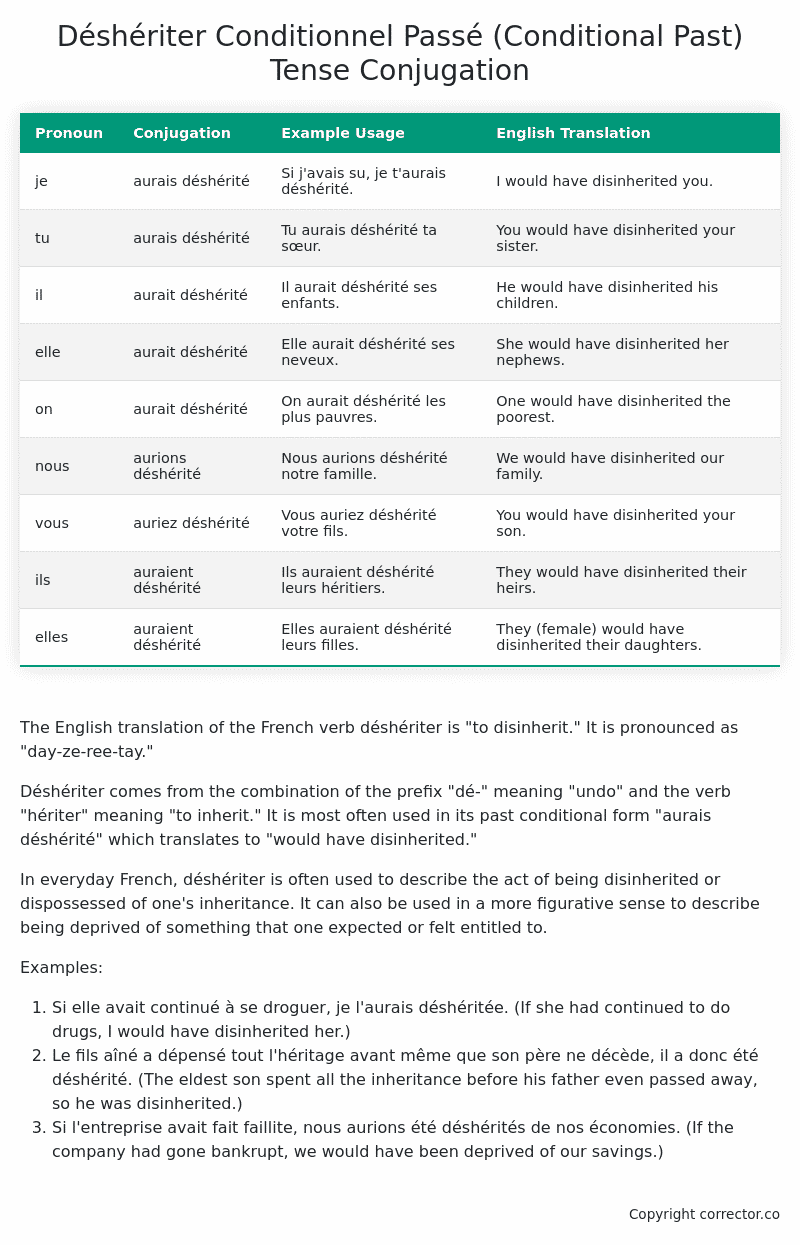Conditionnel Passé (Conditional Past) Tense Conjugation of the French Verb déshériter
Introduction to the verb déshériter
The English translation of the French verb déshériter is “to disinherit.” It is pronounced as “day-ze-ree-tay.”
Déshériter comes from the combination of the prefix “dé-” meaning “undo” and the verb “hériter” meaning “to inherit.” It is most often used in its past conditional form “aurais déshérité” which translates to “would have disinherited.”
In everyday French, déshériter is often used to describe the act of being disinherited or dispossessed of one’s inheritance. It can also be used in a more figurative sense to describe being deprived of something that one expected or felt entitled to.
Examples:
- Si elle avait continué à se droguer, je l’aurais déshéritée. (If she had continued to do drugs, I would have disinherited her.)
- Le fils aîné a dépensé tout l’héritage avant même que son père ne décède, il a donc été déshérité. (The eldest son spent all the inheritance before his father even passed away, so he was disinherited.)
- Si l’entreprise avait fait faillite, nous aurions été déshérités de nos économies. (If the company had gone bankrupt, we would have been deprived of our savings.)
Table of the Conditionnel Passé (Conditional Past) Tense Conjugation of déshériter
| Pronoun | Conjugation | Example Usage | English Translation |
|---|---|---|---|
| je | aurais déshérité | Si j’avais su, je t’aurais déshérité. | I would have disinherited you. |
| tu | aurais déshérité | Tu aurais déshérité ta sœur. | You would have disinherited your sister. |
| il | aurait déshérité | Il aurait déshérité ses enfants. | He would have disinherited his children. |
| elle | aurait déshérité | Elle aurait déshérité ses neveux. | She would have disinherited her nephews. |
| on | aurait déshérité | On aurait déshérité les plus pauvres. | One would have disinherited the poorest. |
| nous | aurions déshérité | Nous aurions déshérité notre famille. | We would have disinherited our family. |
| vous | auriez déshérité | Vous auriez déshérité votre fils. | You would have disinherited your son. |
| ils | auraient déshérité | Ils auraient déshérité leurs héritiers. | They would have disinherited their heirs. |
| elles | auraient déshérité | Elles auraient déshérité leurs filles. | They (female) would have disinherited their daughters. |
Other Conjugations for Déshériter.
Le Present (Present Tense) Conjugation of the French Verb déshériter
Imparfait (Imperfect) Tense Conjugation of the French Verb déshériter
Passé Simple (Simple Past) Tense Conjugation of the French Verb déshériter
Passé Composé (Present Perfect) Tense Conjugation of the French Verb déshériter
Futur Simple (Simple Future) Tense Conjugation of the French Verb déshériter
Futur Proche (Near Future) Tense Conjugation of the French Verb déshériter
Plus-que-parfait (Pluperfect) Tense Conjugation of the French Verb déshériter
Passé Antérieur (Past Anterior) Tense Conjugation of the French Verb déshériter
Futur Antérieur (Future Anterior) Tense Conjugation of the French Verb déshériter
Subjonctif Présent (Subjunctive Present) Tense Conjugation of the French Verb déshériter
Subjonctif Passé (Subjunctive Past) Tense Conjugation of the French Verb déshériter
Subjonctif Imparfait (Subjunctive Imperfect) Tense Conjugation of the French Verb déshériter
Subjonctif Plus-que-parfait (Subjunctive Pluperfect) Tense Conjugation of the French Verb déshériter
Conditionnel Présent (Conditional Present) Tense Conjugation of the French Verb déshériter
Conditionnel Passé (Conditional Past) Tense Conjugation of the French Verb déshériter (this article)
L’impératif Présent (Imperative Present) Tense Conjugation of the French Verb déshériter
L’infinitif Présent (Infinitive Present) Tense Conjugation of the French Verb déshériter
Struggling with French verbs or the language in general? Why not use our free French Grammar Checker – no registration required!
Get a FREE Download Study Sheet of this Conjugation 🔥
Simply right click the image below, click “save image” and get your free reference for the déshériter Conditionnel Passé tense conjugation!

Déshériter – About the French Conditionnel Passé (Conditional Past) Tense
Formation
Common Everyday Usage Patterns
Expressing Unreal Past Scenarios
Polite Requests or Suggestions
Expressing Doubt or Uncertainty
Interactions with Other Tenses
Conditional Present
Indicative Past Tenses
Conditional Future
Summary
Want More?
I hope you enjoyed this article on the verb déshériter. Still in a learning mood? Check out another TOTALLY random French verb conjugation!


